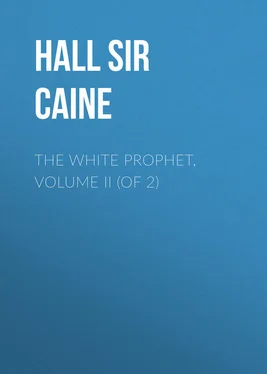Hall Caine - The White Prophet, Volume II (of 2)
Здесь есть возможность читать онлайн «Hall Caine - The White Prophet, Volume II (of 2)» — ознакомительный отрывок электронной книги совершенно бесплатно, а после прочтения отрывка купить полную версию. В некоторых случаях можно слушать аудио, скачать через торрент в формате fb2 и присутствует краткое содержание. Жанр: foreign_antique, foreign_prose, на английском языке. Описание произведения, (предисловие) а так же отзывы посетителей доступны на портале библиотеки ЛибКат.
- Название:The White Prophet, Volume II (of 2)
- Автор:
- Жанр:
- Год:неизвестен
- ISBN:нет данных
- Рейтинг книги:4 / 5. Голосов: 1
-
Избранное:Добавить в избранное
- Отзывы:
-
Ваша оценка:
- 80
- 1
- 2
- 3
- 4
- 5
The White Prophet, Volume II (of 2): краткое содержание, описание и аннотация
Предлагаем к чтению аннотацию, описание, краткое содержание или предисловие (зависит от того, что написал сам автор книги «The White Prophet, Volume II (of 2)»). Если вы не нашли необходимую информацию о книге — напишите в комментариях, мы постараемся отыскать её.
The White Prophet, Volume II (of 2) — читать онлайн ознакомительный отрывок
Ниже представлен текст книги, разбитый по страницам. Система сохранения места последней прочитанной страницы, позволяет с удобством читать онлайн бесплатно книгу «The White Prophet, Volume II (of 2)», без необходимости каждый раз заново искать на чём Вы остановились. Поставьте закладку, и сможете в любой момент перейти на страницу, на которой закончили чтение.
Интервал:
Закладка:
"Oh, how good the Lord is! It is so easy to go now! … John, you must not think I suffer any longer, because I don't. I have no pain now, dear – none whatever."
Then she clasped her wasted hands together in the attitude of prayer and said in a rustling whisper —
"To-night, Lord Jesus! Let it be to-night!"
After that her rapturous voice died away and her ecstatic eyes gently closed, but an ineffable smile continued to play on her faintly-tinted face, as if she were looking on the wings that were waiting to bear her away.
The doctor came in at that moment, and was told what had occurred.
"Delirium, of course," he said. A change had come; the crisis was approaching. If the same thing happened at the supreme moment the patient was not to be contradicted; her delusion was to be indulged.
It did not happen.
In the early hours of the morning the Consul-General was called upstairs. There was a deep silence in the bedroom, as if the air had suddenly become empty and void. The day was breaking, and through the windows that looked over to the Nile the white sails of a line of boats gliding by seemed like the passing of angels' wings. Sparrows were twittering in the eaves, and through the windows to the east the first streamers of the sunrise were rising in the sky.
The Consul-General approached the bed and looked down at the pallid face on the pillow. He wanted to stoop and kiss it, but he felt as if it would be a profanation to do so now. His own face was full of suffering, for the sealed chambers of his iron soul had been broken open at last.
With his hands clasped behind his back he stood for some minutes quite motionless. Then laying one hand on the brass head-rail of the bed, he leaned over his dead wife and spoke to her as if she could hear.
"Forgive me, Janet! Forgive me!" he said in a low voice that was like a sob.
Did she hear him? Who can say she did not? Was it only a ray from the sunrise that made the Egyptian woman think that over the dead face of the careworn and weary one, whose sweet soul was even then winging its way to heaven, there passed the light of a loving smile?
CHAPTER XVII
Within three days the softening effects on the Consul-General of Lady Nuneham's death were lost. Out of his very bereavement and the sense of being left friendless and alone he became a harder and severer man than before. His secretaries were more than ever afraid of him, and his servants trembled as they entered his room.
It heightened his anger against Gordon to believe that by his conduct he had hastened his mother's end. In his absolute self-abasement there were moments when he would have found it easier to forgive Gordon if he had been a prodigal, a wastrel, prompted to do what he had done by the grossest selfishness; but deep down in some obscure depths of the father's heart the worst suffering came of the certainty that his son had been moved by that tragic earnestness which belongs only to the greatest and noblest souls.
Still more hardening and embittering to the Consul-General than the memory of Gordon was the thought of Ishmael. It intensified his anger against the Egyptian to feel that having first by his "visionary mummery," by his "manoeuvring and quackery," robbed him of his son, he had now, by direct consequence, robbed him of his wife also.
All the Consul-General's bull-necked strength, all his force of soul, were roused to fury when he thought of that. He was old and tired and he needed rest, but before he permitted himself to think of retirement, he must crush Ishmael Ameer.
Not that he allowed himself to recognise his vindictiveness. Shutting his eyes to his personal motive, he believed he was thinking of England only. Ishmael was the head-centre of an anarchical conspiracy which was using secret and stealthy weapons that were more deadly than bombs; therefore Ishmael must be put down, he must be trampled into the earth, and his movement must be destroyed.
But how?
Within a few hours after Lady Nuneham's funeral the Grand Cadi came by night, and with many vague accusations against "the Arab innovator," repeated his former warning —
"I tell you again, O Excellency, if you permit that man to go on it will be death to the rule of England in Egypt."
"Then prove what you say – prove it, prove it," cried the Consul-General, raising his impatient voice.
But the suave old Moslem judge either could not or would not do so. Indeed, being a Turkish official, accustomed to quite different procedure, he was at a loss to understand why the Consul-General wanted proof.
"Arrest the offender first and you'll find evidence enough afterwards," he said.
An English statesman could not act on lines like those, so the Consul-General turned back to the despatches of the Sirdar. The last of them – the one received during the dark hours preceding his wife's death – contained significant passages —
"If this man should develop supernatural pretensions I shall know what to do."
Ha! There was hope in that! The charlatan element in Ishmael Ameer might carry him far if only the temptation of popular idolatry were strong enough.
Once let a man deceive himself with the idea that he was divine, nay, once let his followers delude themselves with the notion of his divinity, and a civilised Government would be bound to make short work of him. Whosoever and whatsoever he might be, that man must die!
A sudden cloud passed over the face of the Consul-General as he glanced again at the Sirdar's despatch and saw its references to Christ.
"How senseless everybody is becoming in this world," he thought.
Pontius Pilate! Pshaw! When would religious hypocrisy open its eyes and see that, according to all the laws of civilised states, the Roman Governor had done right? Jesus claimed to be divine, His people were ready to recognise Him as King; and whether His kingdom was of this world or another, what did it matter? If His pretensions had been permitted they would have led to wild, chaotic, shapeless anarchy. Therefore Pilate crucified Jesus, and, scorned though he had been through all the ages, he had done no more than any so-called "Christian" governor would be compelled to do to-day.
"Jesus of Nazareth, the King of the Jews." Why would not people understand that these words were written not in derision but in self-defence? There could be only one authority in Palestine then, and there could be only one authority in Egypt now.
"If this visionary mummer, with his empty quackeries, should develop the idea that he is divine, or even the messenger of divinity, I will hang him like a dog!" thought the Consul-General.
CHAPTER XVIII
Five days after the death of Lady Nuneham the Consul-General was reading at his breakfast the last copy of the Times to arrive in Cairo. It contained an anticipatory announcement of a forthcoming Mansion House Banquet in honour of the King's Birthday. The Foreign Minister was expected to speak on the "unrest in the East, with special reference to the affair of El Azhar."
The Consul-General's face frowned darkly, and he began to picture the scene as it would occur. The gilded hall, the crowd of distinguished persons eating in public, the mixed odours of many dishes, the pop of champagne corks, the smoke of cigars, the buzz of chatter like the gobbling of geese on a green, and then the Minister, with his hand on his heart, uttering timorous apologies for his Proconsul's policy, and pouring out pompous platitudes as if he had newly discovered the Decalogue.
The Consul-General's gorge rose at the thought. Oh, when would these people, who stayed comfortably at home and lived by the votes of the factory-hands of Lancashire and Yorkshire, and hungered for the shouts of the mob, understand the position of men like himself, who, in foreign lands, among alien races, encompassed by secret conspiracies, were spending their strength in holding high the banner of Empire?
Читать дальшеИнтервал:
Закладка:
Похожие книги на «The White Prophet, Volume II (of 2)»
Представляем Вашему вниманию похожие книги на «The White Prophet, Volume II (of 2)» списком для выбора. Мы отобрали схожую по названию и смыслу литературу в надежде предоставить читателям больше вариантов отыскать новые, интересные, ещё непрочитанные произведения.
Обсуждение, отзывы о книге «The White Prophet, Volume II (of 2)» и просто собственные мнения читателей. Оставьте ваши комментарии, напишите, что Вы думаете о произведении, его смысле или главных героях. Укажите что конкретно понравилось, а что нет, и почему Вы так считаете.












